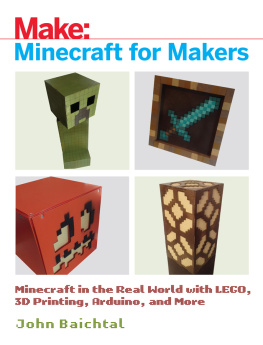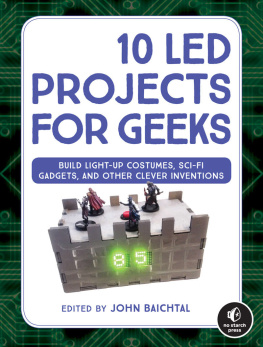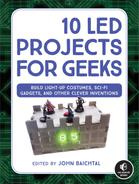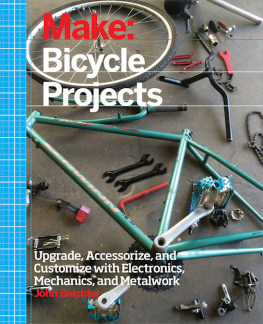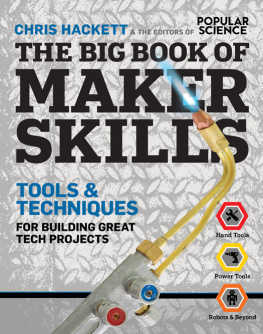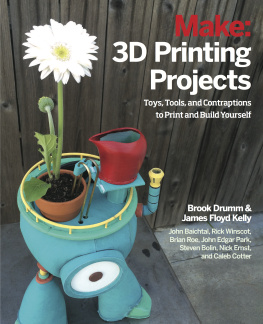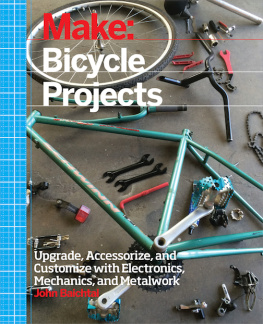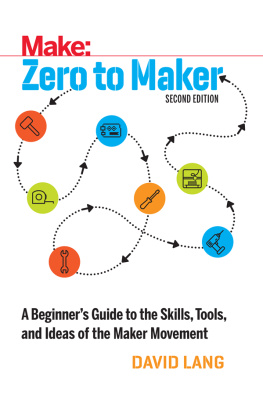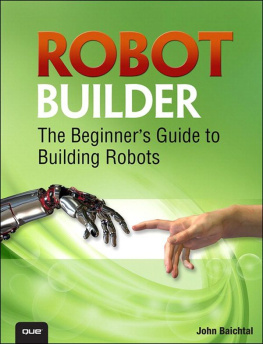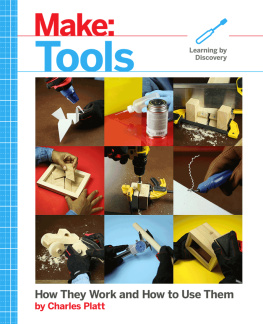Hack This:
24 Incredible Hackerspace Projects from the DIY Movement
John Baichtal

800 East 96th Street
Indianapolis, Indiana 46240 USA
HACK THIS: 24 INCREDIBLE HACKERSPACE PROJECTS FROM THE DIY MOVEMENT
Copyright 2012 by John Baichtal
All rights reserved. No part of this book shall be reproduced, stored in a retrieval system, or transmitted by any means, electronic, mechanical, photocopying, recording, or otherwise, without written permission from the publisher. No patent liability is assumed with respect to the use of the information contained herein. Although every precaution has been taken in the preparation of this book, the publisher and author assume no responsibility for errors or omissions. Nor is any liability assumed for damages resulting from the use of the information contained herein.
ISBN-13: 978-0-7897-4897-3
ISBN-10: 0-7897-4897-5
The Library of Congress Cataloging-in-Publication Data is on file.
Printed in the United States of America
First Printing: October 2011
EDITOR IN CHIEF
Greg Wiegand
ACQUISITIONS EDITOR
Rick Kughen
DEVELOPMENT EDITOR
Rick Kughen
TECHNICAL EDITOR
Mark Reddin
MANAGING EDITOR
Sandra Schroeder
PROJECT EDITOR
Mandie Frank
COPY EDITOR
Megan Wade
INDEXER
Lisa Stumpf
PROOFREADER
Leslie Joseph
PUBLISHING COORDINATOR
Cindy Teeters
DESIGNER
Anne Jones
COMPOSITOR
Studio Galou, LLC
Trademarks
All terms mentioned in this book that are known to be trademarks or service marks have been appropriately capitalized. Que Publishing cannot attest to the accuracy of this information. Use of a term in this book should not be regarded as affecting the validity of any trademark or service mark.
Warning and Disclaimer
Every effort has been made to make this book as complete and as accurate as possible, but no warranty or fitness is implied. The information provided is on an as is basis. The author and the publisher shall have neither liability nor responsibility to any person or entity with respect to any loss or damages arising from the information contained in this book.
Bulk Sales
Que Publishing offers excellent discounts on this book when ordered in quantity for bulk purchases or special sales. For more information, please contact
U.S. Corporate and Government Sales
1-800-382-3419
For sales outside of the U.S., please contact
International Sales
About the Author
John Baichtal is the founding member of Twin Cities Maker, a hackerspace organization that has been collaborating for almost two years. Twin Cities Maker has its own rented warehouse, the Hack Factory, complete with a welding station, a woodshop, a classroom, and an electronics area. John is currently writing The Cult of Lego, a book about adult Lego builders for No Starch Press. He has written dozens of articles for print, including pieces for MAKE Magazine, Kobold Quarterly (a D&D magazine), and 2600: The Hacker Quarterly. He has blogged for Wired.com (GeekDad blog) for four years and Make: Online for a year, with more than 1,000 posts published during that time.
Dedication
To hackers everywhere, for expanding the realm of the possible;
to Eileen Arden, Rosie, and Jack, for their limitless interest in the mysteries of the world; and to Elise, for making it all worth it.
Acknowledgments
I want to thank Gareth Branwyn for his assistance and encouragement in this project, and to all the hackerspace members who contributed projects and photos to this book.
We Want to Hear from You!
As the reader of this book, you are our most important critic and commentator. We value your opinion and want to know what were doing right, what we could do better, what areas youd like to see us publish in, and any other words of wisdom youre willing to pass our way.
As an editor in chief for Que Publishing, I welcome your comments. You can email or write me directly to let me know what you did or didnt like about this bookas well as what we can do to make our books better.
Please note that I cannot help you with technical problems related to the topic of this book. We do have a User Services group, however, where I will forward specific technical questions related to the book.
When you write, please be sure to include this books title and author as well as your name, email address, and phone number. I will carefully review your comments and share them with the author and editors who worked on the book.
Email:
Mail: Greg Wiegand
Editor in Chief
Que Publishing
800 East 96th Street
Indianapolis, IN 46240 USA
Reader Services
Visit our website and register this book at informit.com/register for convenient access to any updates, downloads, or errata that might be available for this book.
Foreword: Support Your Local Hackerspace
At Maker Faire Detroit in the summer of 2011, I found a maker exhibit inside the Henry Ford Museum where a medium-sized helium balloon was rising and falling gracefully. When I talked to the group of makers, I learned that the five of them were members of the LVL1 Hackerspace in Louisville, KY. Their project was called White Star Balloon (whitestarballoon.com). As they told me proudly, the goal of their project was to accomplish the first successful trans-Atlantic crossing by a small robotic weather balloon. With perfect irony, they explained that the name White Star came from the shipping company that built the Titanic. As makers, they anticipated some failure before eventually succeeding.
As much as the project itself excited me, I was happy to know that this project had come from the LVL1 hackerspace. In 2009, three people from Louisville, two of whom were teachers, came to the Maker Faire Bay Area where they first learned about hackerspaces and interacted with others who had organized them. Immediately, they thought Louisville should have its own hackerspace, and by July 2010, it did. Soon LVL1 became a gathering place for a number of people with various levels of technical expertise, many of whom did not know that others like them existed. One of them was Dan Bowen, a ballooning enthusiast who worked by day in R&D at an autoparts maker. At LVL1, Dan found others who shared his interest and were willing to contribute in unique ways to this ambitious project. Some were students at the university; others like Bowen had day jobs but wanted to be part of something new and fun. None of them were the founders of the LVL1 hackerspace but the space made the project possible.
I enjoyed talking to the White Star Balloon team about various electronic systems they built for the project. Its automated ballast system, which normally was a soda bottle filled with alcohol, had to be modified for Henry Ford Museum to work with BBs instead. The balloon I saw rising and falling was doing so under the control of an Arduino microntroller, which they had programmed. They were a team of experimenterssmart, enthusiastic and determined. They were self-organized, self-funded, and self-motivated. They were exactly the kind of people and projects that I wanted Maker Faire to discover and celebrate.
The White Star Balloon project is just one example of what were seeing from hackerspaces. In areas like Detroit, weve seen new hackerspaces become a reality in just the last year or two. I3 Detroit has 70 members, many of whom have donated tools to the space, which itself continues to expand. OCD is a hackerspace located in Eastern Market, a former meatpacking area that is now the site of a weekend farmers market. The Mt. Elliott Makerspace is located in the basement of a church and serves neighborhood children who are learning to solder and make musical instruments. On a Saturday morning at Eastern Market, the kids from the Mt. Elliott Makerspace were teaching teenagers and adults how to solder, right next to summer tomatoes and cantaloupes.


